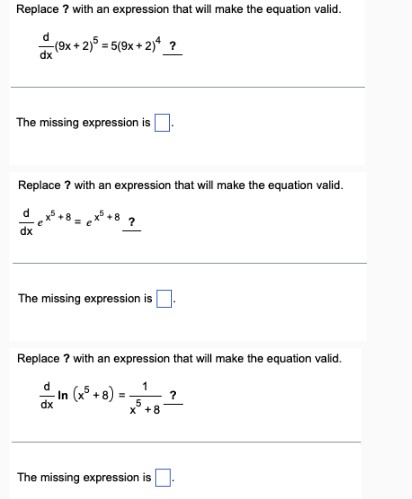QQuestionAnatomy and Physiology
QuestionAnatomy and Physiology
Replace **?** with an expression that will make the equation valid.
\frac{d}{dx}(9x + 2)^5 = 5(9x + 2)^4 \quad ?
The missing expression is ☐.
Replace **?** with an expression that will make the equation valid.
\frac{d}{dx} e^{x^5 + 8} = e^{x^5 + 8} \quad ?
The missing expression is ☐.
Replace **?** with an expression that will make the equation valid.
\frac{d}{dx} \ln \left(x^5 + 8\right) = \frac{1}{x^5 + 8} \quad ?
The missing expression is ☐.
Attachments

6 months agoReport content
Answer
Full Solution Locked
Sign in to view the complete step-by-step solution and unlock all study resources.
Step 1: To make the first equation valid, we need to find the derivative of 1$ using the chain rule.
The chain rule states that the derivative of a composite function \(f(g(x))\) is \(\frac{df}{dx} = f'(g(x)) \cdot g'(x)\).
Step 2: Let 1$.
Then, 1$.
Final Answer
--- Step 1: To make the second equation valid, we need to find the derivative of 1$.
Need Help with Homework?
Stuck on a difficult problem? We've got you covered:
- Post your question or upload an image
- Get instant step-by-step solutions
- Learn from our AI and community of students